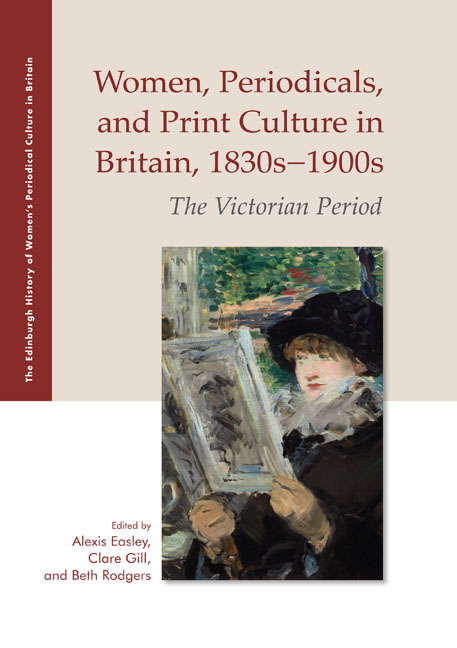Book contents
- Frontmatter
- Contents
- List of Illustrations
- Acknowledgments
- Introduction: Women, Periodicals, and Print Culture in the Victorian Period
- Part I (Re)Imagining Domestic Life
- Part II Constructing Modern Girls and Young Women
- Part III Women and Visual Culture
- Part IV Making Space for Women
- Part V Constructing Women Readers and Writers
- Constructing Women Readers and Writers: Introduction
- 24 ‘Afford[ing] me a Place’: Recovering Women Poets in Blackwood's Edinburgh Magazine, 1827–1835
- 25 Constructing the Mass-Market Woman Reader and Writer: Eliza Cook and the Weekly Dispatch, 1836–1850
- 26 Elizabeth Gaskell and the Habit of Serialisation
- 27 Gender and Genre in Reviews of the Theological Novel
- 28 Reading Poet Amy Levy through Victorian Newspapers
- 29 ‘I simply write it to order’: L. T. Meade, Sisters of Sherlock, and the Strand Magazine
- Part VI Intervening in Political Debates
- Notes on Contributors
- Index
- Plate section
28 - Reading Poet Amy Levy through Victorian Newspapers
from Part V - Constructing Women Readers and Writers
Published online by Cambridge University Press: 25 October 2019
- Frontmatter
- Contents
- List of Illustrations
- Acknowledgments
- Introduction: Women, Periodicals, and Print Culture in the Victorian Period
- Part I (Re)Imagining Domestic Life
- Part II Constructing Modern Girls and Young Women
- Part III Women and Visual Culture
- Part IV Making Space for Women
- Part V Constructing Women Readers and Writers
- Constructing Women Readers and Writers: Introduction
- 24 ‘Afford[ing] me a Place’: Recovering Women Poets in Blackwood's Edinburgh Magazine, 1827–1835
- 25 Constructing the Mass-Market Woman Reader and Writer: Eliza Cook and the Weekly Dispatch, 1836–1850
- 26 Elizabeth Gaskell and the Habit of Serialisation
- 27 Gender and Genre in Reviews of the Theological Novel
- 28 Reading Poet Amy Levy through Victorian Newspapers
- 29 ‘I simply write it to order’: L. T. Meade, Sisters of Sherlock, and the Strand Magazine
- Part VI Intervening in Political Debates
- Notes on Contributors
- Index
- Plate section
Summary
A MY LEVY'S FIN-DE-SIÈCLE publishing career began and ended with poems in women's magazines. Her first publication was ‘The Ballad of Ida Grey (A Story of Woman's Sacrifice)’ in Pelican, a short-lived periodical subtitled A Quarterly Magazine, Advocating the Social and Educational Progress of Woman (1875: 20–1), and her final publication was ‘At Dawn’ in Woman's World (1890: 65). A novelist and poet, Levy is best known for being the first Jewish student at Newnham College, Cambridge. She is also remembered for the lesbian and feminist themes in her poetry and for her suicide on 10 September 1889. Most discussion of her poetry refers to the three volumes that mapped her tragically short career: Xantippe, and Other Verse (1881), A Minor Poet and Other Verse (1884), and A London Plane-Tree and Other Verse (1889). Yet she also published thirty-seven poems in periodicals, as well as a serial novel, twenty-two short stories, and eleven essays. To ignore the role of periodicals in her career is thus to miss a crucial dimension of her work, even to distort her achievement and her engagement with the publishing world. That her best-known poem, ‘Xantippe,’ first appeared in a periodical is telling, as was her timing: her revisionary dramatic monologue, which revised traditional accounts of Socrates’ wife as an infamous shrew, appeared in University Magazine (formerly Dublin University Magazine) just as she was embarking on her own university career at Newnham (1880: 592–7; Hughes 2009: 259–81).
In this essay, I focus on a subset of Levy's periodical poems, those in weekly and daily newspapers. Though such an analysis may seem unduly narrow, I would argue that her newspaper poetry has wider significance in several respects. Natalie Houston, Andrew Hobbs, and Kirstie Blair have recently probed the general significance of Victorian newspaper poetry. Houston emphasises its role in extending Britain's imagined community, opening channels for emotional and aesthetic response to current events that so many readers encountered in the daily press (2008: 241). Hobbs establishes that millions of nineteenth-century poems originated in provincial newspapers, mostly weeklies, rather than in London-based monthly periodicals; like Houston, he also adduces newspaper poetry's journalistic function (2012: 488, 490). Blair extends the parameters of scholarly investigation by specifically examining Scottish workingclass newspaper poetry, which encompassed poems as well as advert jingles that sparked discussion of poetics and poetry in correspondence columns (2014: 189).
- Type
- Chapter
- Information
- Women, Periodicals and Print Culture in Britain, 1830s–1900sThe Victorian Period, pp. 456 - 469Publisher: Edinburgh University PressPrint publication year: 2019



